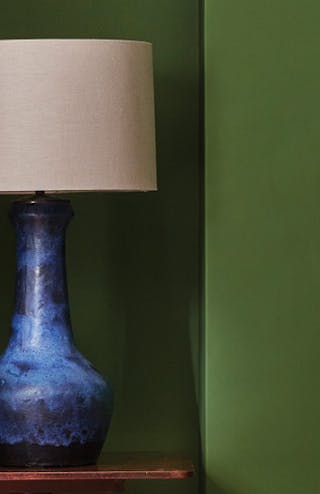
Double Drenching
Hopper Living Room
By using two or more shades of green, you can achieve a room that captures the power of nature whilst feeling cohesive, sophisticated, and visually engaging. Combine walls in bold green, Hopper, with contrasting zesty Citrine, and the confident deep green, Dark Brunswick Green, on the ceiling.
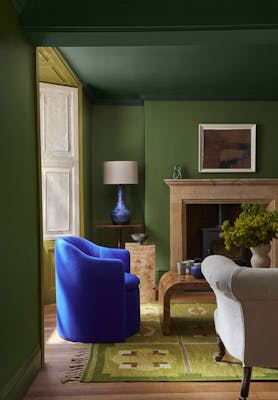
Royal Navy Bedroom
‘Double Drenching’ works best when you combine colours with a variation in hue rather than strength. The subtle contrasts between ‘Royal Navy’, ‘Dock Blue’ and ‘Smalt’ provides visual interest, complementing each other to create a captivating bedroom.
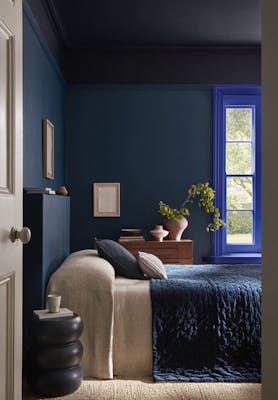
Yellow-Pink Kitchen
Combining colours from the same family will add depth and dimension to a kitchen, creating a layered look that makes the space feel dynamic. Use yellows, honeys and golds to create an energised environment, a wonderful warm backdrop to pops of bright red and turquoise.
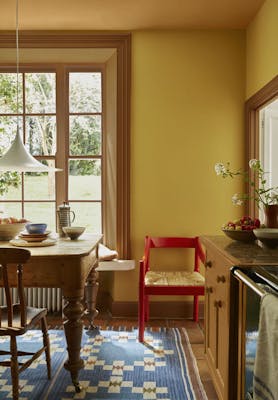
“Since first introducing the ‘Colour Drenching’ approach back in 2021, we have seen customers move away from traditional schemes to embrace deep and mid-tone hues from floor to ceiling and everything in between, creating really engaging, inviting spaces. ‘Double Drenching’ is an expansion of this colour confidence, taking the concept into a highly creative, sophisticated and nuanced approach to decoration.” - Ruth Mottershead

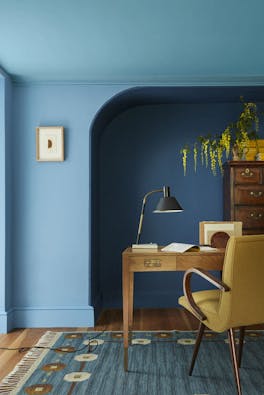
Blue Verditer Study
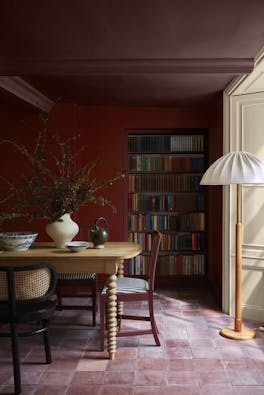
Bronze Red Dining Room

Brighton Child’s Room

Córdoba Hallway
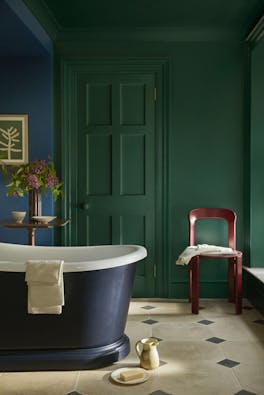
Mid Azure Green Bathroom
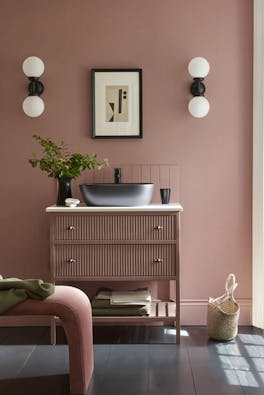
Hellebore Bathroom

Light Bronze Green Hallway
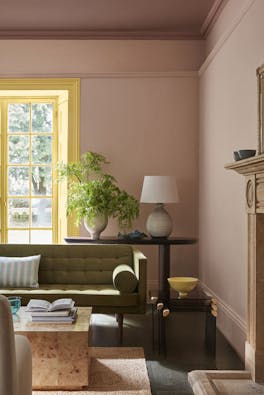
Masquerade Living Room
‘Double Drenching’ FAQs
What is ‘Double Drenching’?
‘Double Drenching’ is the process of dramatically transforming a space by painting all available surfaces in two or more related colours. In ‘Double Drenching’ schemes, you can combine colours that might not typically be used together.
This means using shades from one colour family that have varying undertones – for example, three different greens. Paint all elements of your space – walls, woodwork, skirtings, doors and trim – in your chosen shades to create a striking, dynamic scheme.
How do I choose colours for ‘Double Drenching’?
With ‘Double Drenching’, the variation between the colours is in hue rather than strength. So, whilst the colours you choose might be as bold as each other and from the same family, they carry different undertones.
Using the Little Greene colour card can simplify this process. Incorporate colours that are near or next to each other, rather than just the tonal shades that sit above and below.
This approach to choosing colour can produce some intriguing, unexpected combinations. You might pair Hopper with Citrine and Dark Brunswick Green. Or drench your scheme in Woad with Tivoli and Blue Verditer.
How is ‘Double Drenching’ different to ‘Colour Drenching’?
‘Colour Drenching’ is where you envelop a room with a single colour across the walls, ceiling, woodwork and skirting. To create a colour-drenched scheme, you simply choose one shade and confidently paint it everywhere.
However, ‘Double Drenching’ takes the ‘Colour Drench’ aesthetic one step further, by introducing additional, related colours within the scheme.
‘Double Drench’ schemes include two or more colours from one family. Instead of using only Hopper to paint all surfaces, a ‘Double Drenched’ scheme would incorporate greens with varying undertones. Adding Citrine and Dark Brunswick Green can highlight different parts of the space.
Learn more about Colour Drenching
What is the difference between using the ‘Colour Scales’ and ‘Double Drenching’?
A traditional way of decorating uses tonal variations of a single colour to achieve a harmonious look. Perhaps three strengths of a neutral colour used across walls, woodwork and painted ceilings. With our ‘Colour Scales’ palette, you can combine shades from one column to create this classic, coordinated style. For example French Grey – Pale sits perfectly alongside French Grey – Mid and French Grey.
In ‘Double Drenching’ schemes, combine colours that have different undertones, rather than just different strengths of one colour. Instead of pairing Yellow-Pink with neutrals from the Silent White family, you might consider different hues from across the colour cards. Introducing rich yellow and golden shades like Bassoon, Middle Buff and Affogato could create a layered, dynamic scheme.
Explore our ‘Colour Scales’ palette
Which colours work well for ‘Double Drenching’?
You can apply a ‘Double Drenching’ approach with almost any colour. But this approach often works best if you build your scheme on strong, impactful shades.
This style of decorating is all about embracing the power of colour. ‘Double Drenching’ provides an opportunity to combine bold shades that might not typically be used alongside one another in a single scheme.
Combining bold colours can create a space with real wow-factor and an element of surprise. Statement combinations often produce some of the most effective double-drenched spaces. Combine Deep Space Blue with Royal Navy and Smalt. Or paint Bronze Red with Arras.
How many colours does a ‘Double Drench’ scheme include?
‘Double Drenching’ schemes include at least two different colours. But it is really up to you how many shades to include, depending on the look you want to achieve.
A simple pairing of two pinks can be an elegant choice for your bedroom or living space. For example, Masquerade on walls and Blush on the ceiling.
Or reflect the fast-paced energy of a busy family kitchen with a palette of up to four different yellows, oranges and browns. Shades like Yellow-Pink, Affogato, Bassoon and Middle Buff create an energetic scheme. Then consider a bold red like Atomic Red to provide a contrasting colour highlight on a piece of furniture.
Where should I use the different colours in a ‘Double Drenching’ scheme?
Similarly to ‘Colour Drenching’, ‘Double Drenching’ means enveloping your entire space in beautiful, all-over colour.
There is no room for white ceilings or skirtings with this style of decorating. Instead, you can utilise the shades in your ‘Double Drench’ palette to highlight different architectural features within your space.
Consider painting your walls and trim in one colour, then choose another colour to paint your ceiling. Your window frames, furniture, skirting boards, door architraves and dado rail can all host an impactful colour highlight. Accentuating these surfaces with pops of colour will achieve a confident, double-drenched look.
Find more inspiration in our guide to refreshing interior woodwork.
